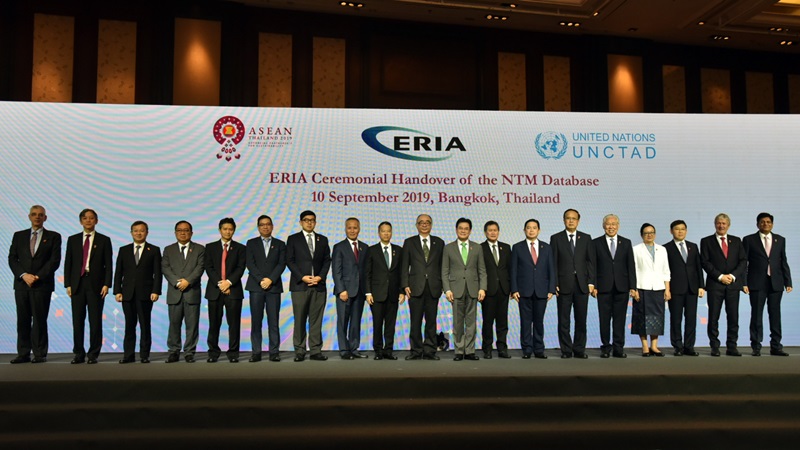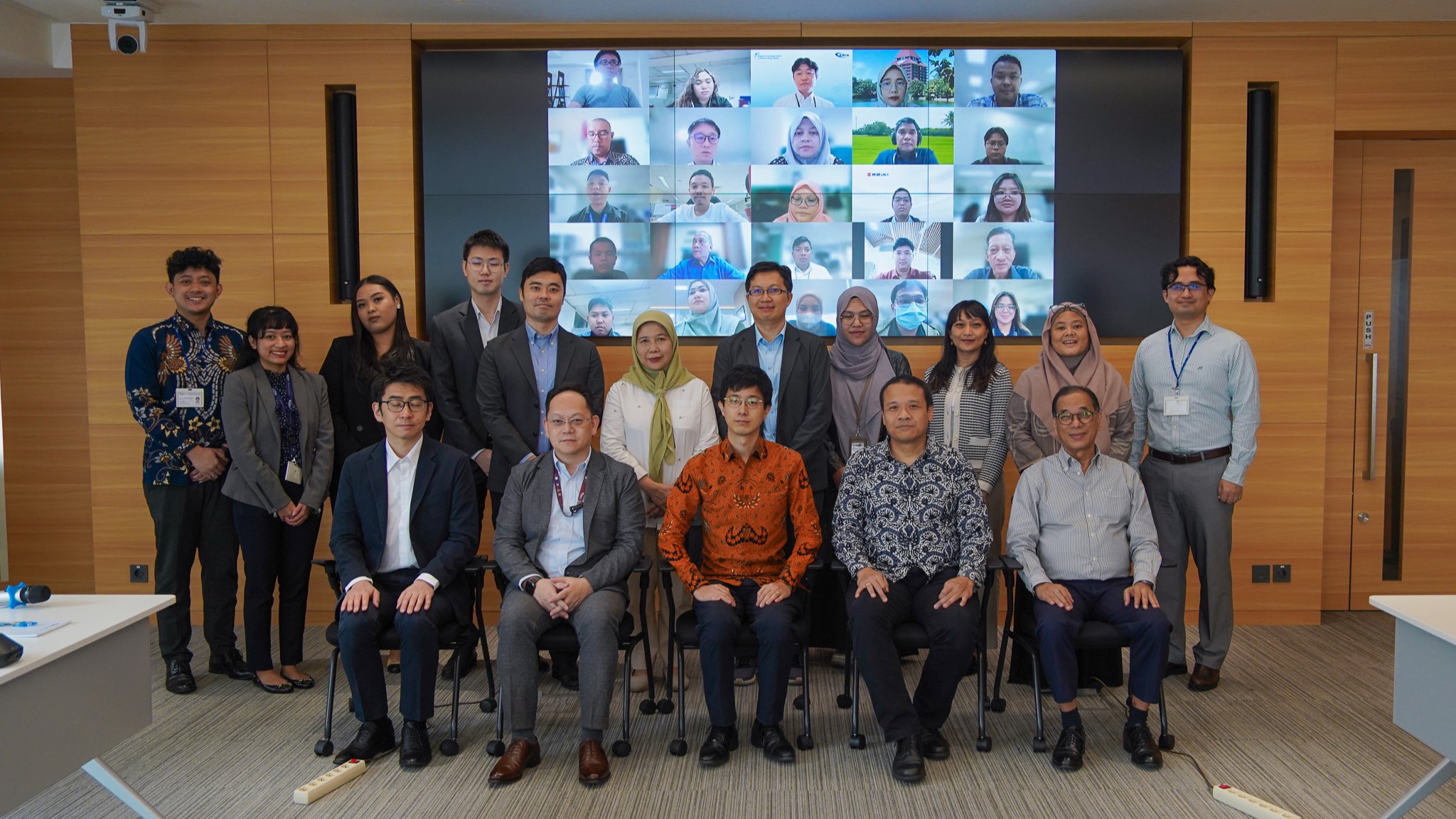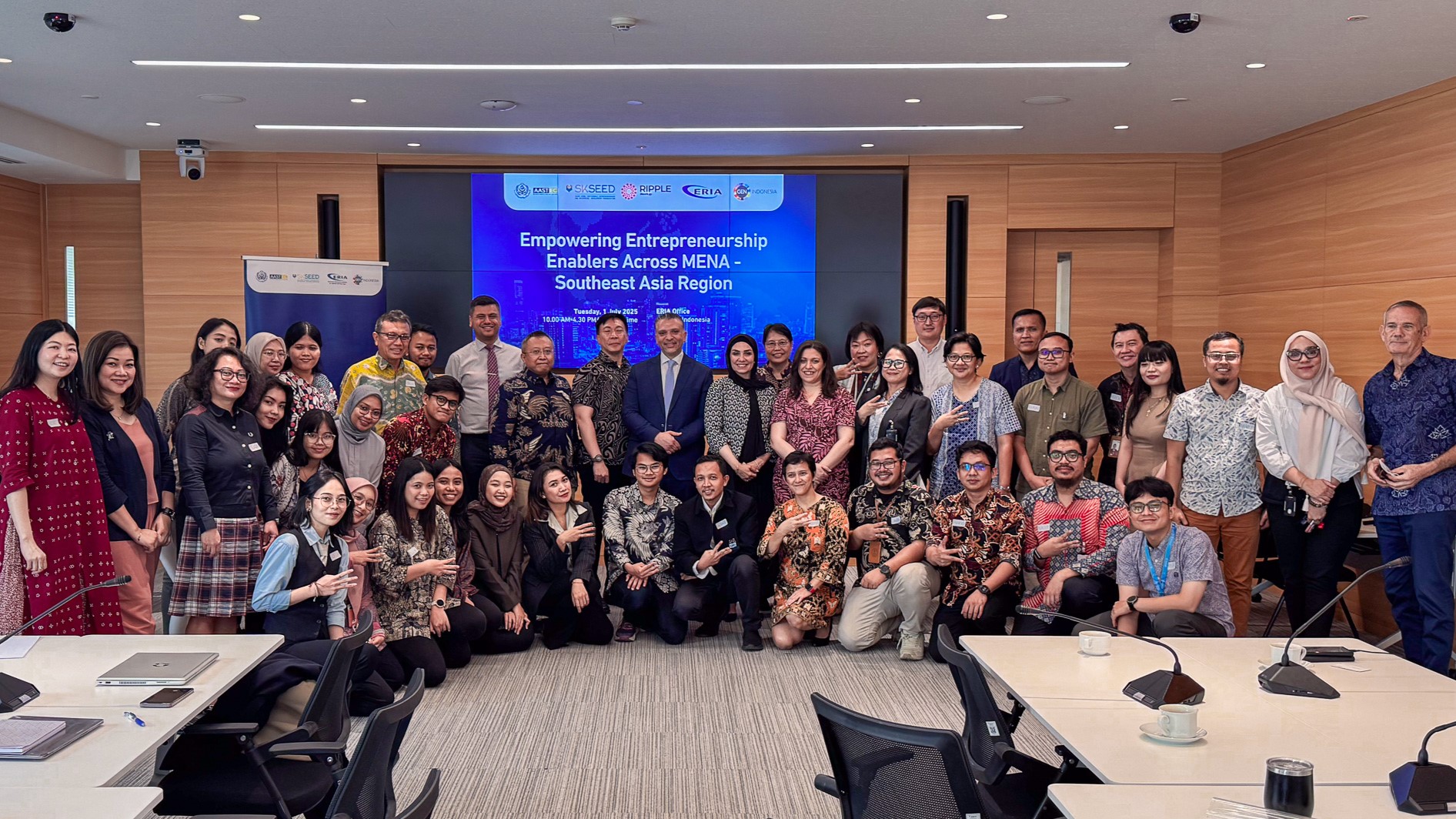ERIA Participates in the 51st ASEAN Economic Ministers Meeting and Related Meetings
Share Article:
Print Article:
Bangkok, 10 September 2019: The 51st ASEAN Economic Ministers (AEM) Meeting, the 7th East Asia Summit (EAS) Economic Ministers’ Meeting and other related meetings were held in Bangkok, Thailand from 3 - 10 September 2019. Prof. Hidetoshi Nishimura, the President of ERIA, led a delegation which included ERIA economists and other senior ERIA officials.
The 51st ASEAN Economic Ministers Meeting Joint Media Statement noted ERIA’s contributions in several paragraphs (see JMS here):
Good Regulatory Practices (GRP)
- The Ministers noted the progress of the Baseline Study on Regulatory Management Systems (RMS) in ASEAN, prepared with assistance from the Economic Research Institute for ASEAN and East Asia (ERIA). The Baseline Study is a deliverable under the ASEAN Work Plan on GRP 2016-2025 and aims to map RMS developments in the region, including ASEAN and AMS’ initiatives to stocktake and streamline regulations and administrative processes/practices, and to assess if they conform with the ASEAN GRP Core Principles.
Economic Research Institute for ASEAN and East Asia (ERIA)
- The Ministers thanked the Economic Research Institute for ASEAN and East Asia (ERIA) for the work undertaken in co-operation with the UNCTAD in developing the , a good resource in assisting ASEAN Member States in populating and developing the NTMs section of their National Trade Repositories (NTRs), as well as in the on-going in-country training on NTMs collection, classification and analysis. The Ministers also expressed their appreciation for ERIA’s continued support for ASEAN economic integration thru its on-going and future research activities such as the study on ASEAN Seamless Trade Facilitation Indicators (ASTFI) and Trade Transaction Cost (TTC), that would help determine the reduction by 10% in trade transactions cost in the region by 2020; the ASEAN Regulatory Management System (RMS) to provide a baseline on the implementation of core principles of Good Regulatory Practices in ASEAN; as well as the impact study of ASEAN Economic Integration, which will be a valuable input to the mid-term review of the AEC. Further, the Ministers are cognizant of the contribution of ERIA in supporting the Regional Comprehensive Economic Partnership (RCEP) negotiations and the development of the Guideline on Skilled Labour/Professional Services Development in Response to the 4IR. The Ministers requested ERIA to continue its policy-oriented research activities based on continuous interaction between ERIA and the Senior Economic Officials.
7th EAS Economic Ministers’ Meeting, 10 September 2019
In his opening statement, Prof. Hidetoshi Nishimura thanked all the Economic Ministers for providing the opportunity to present ERIA’s work and expressed appreciation for their continued support of ERIA’s work.
Premised on the awareness that EAS Member Countries could be global pace setters in regulatory and institutional cooperation in adapting to the digital revolution, Prof. Nishimura emphasised the need for effective policy measures, proposing three main strategies:
- Use digital technology to improve trade facilitation nationally and regionally, such as ASEAN Single Window and Mutual Recognition Agreements;
- Engender inclusive growth through MSME and skills development by applying digital innovations and relevant trainings; and
- Strengthen digital connectivity and data transaction governance to promote smooth cross-border data flows with trust.
Prof. Nishimura closed ERIA’s briefing to the Ministers by stating that ERIA is willing to respond to any request to enhance regional cooperation and concerted regulatory reform geared towards digital transformation in this region.
ERIA was very pleased to note that the Ministers stated the importance of harnessing the digital revolution to facilitate trade and to enhance inclusive growth in the 5th paragraph of their Joint Media Statement:
- The Ministers exchanged views about how to harness the digital revolution to facilitate trade and investment. They also agreed on the need to promote inclusive growth through policies aimed at delivering new opportunities for MSMEs and building new skills. In this context, the Ministers highlighted the need for improved digital connectivity and underscored the importance of ensuring interoperability across systems in the online environment. They also discussed the opportunities of the digital economy and noted that dialogue and cooperation on digital connectivity would support regional integration, promote competitiveness and inclusiveness for SMEs, and would complement the Master Plan on ASEAN Connectivity 2025. The Ministers also discussed how their governments were seeking to adapt their economies by making use of the technological advances that will drive the 4th Industrial Revolution. They recognised that sound policies were needed in a range of areas to enhance growth and maximise the benefits to be derived from new technologies.
ERIA was also very pleased that the Ministers commended ERIA’s work in paragraph 8 of the same Joint Media Statement:
- The Ministers commended ERIA’s continued research and analysis on regional economic issues. The Ministers also welcomed the report of the 12th ERIA Governing Board Meeting held on 24 May 2019 in Jakarta, Indonesia, which highlights the need to generate more policy-oriented research and analysis. The Ministers noted ERIA’s support in the development of ASEAN Non-Tariff Measures (NTMs) database.
Side Event: ERIA Ceremonial Handover of the NTM Database, 10 September 2019
On the sidelines of the AEM and EAS Meetings, ERIA organised a ceremony to hand over the updated Non-Tariff Measures Database developed by ERIA together with the United Nations Conference on Trade and Development (UNCTAD). Prof. Nishimura handed over the database to Dato Paduka Lim Jock Hoi, the Secretary General of ASEAN, as EAS Ministers and high-level officials witnessed the event.
Dato Lim expressed his appreciation for the hard work of ERIA and UNCTAD in developing the Database. Moreover, he noted that the Database also complement other ASEAN trade facilitation initiatives such as ASEAN Solutions for Investments, Services, and Trade; ASEAN Trade Repository; ASEAN Single Window; ASEAN Customs Transit System; and ASEAN-Wide Self-Certification.
‘The Database is a core ASEAN effort in tackling Non-Tariff Barriers in the region, aimed at facilitating trade and simplifying cross-border procedures. Having the Database is crucial, as it will support ASEAN exporters in understanding and complying with trade formalities and regulations that apply to their products. This effort can also help MSMEs improve their competitiveness, by having direct access to reliable and fully validated NTMs. This would, in turn, facilitate more regional firms, including MSMEs, to trade and integrate within regional and global value chains, expanding the benefits of the AEC in promoting inclusive growth and sustainable development,’ said Dato Lim.
Bilateral Meeting with Dr Ceferino S. Rodolfo Jr, Undersecretary, Department of Trade and Industry (DTI) of the Philippines
Prof. Nishimura held a bilateral meeting with Dr Ceferino S. Rodolfo Jr, Undersecretary of the Department of Trade and Industry (DTI) of the Philippines to report on the publication of ASEAN Vision 2040, ERIA’s recent project with the Government of Thailand as ASEAN Chair and was also one of the last major research projects of the late Dr Ponciano S. Intal Jr. Prof. Nishimura spoke highly of Dr Intal’s contribution and his leadership in ERIA.
He also reported on the progress of the ASEAN Seamless Trade Facilitation Indicators (ASTFI) project which had been initially requested by the Philippines Government in 2017. ERIA has already completed the baseline study of in consultation with ASEAN Member States (AMS) which was reported to ASEAN Trade Facilitation Joint Consultative Committee (ATFJCC) in 2018. Prof. Nishimura also requested the cooperation of the Government of the Philippines to continue the support for this effort, as well as in providing the necessary data on the Time Release Study to complete the assessment of the Trade Transaction Costs.
Prof. Nishimura also asked for guidance regarding a possible region-wide study after the completion of the Regional Comprehensive Economic Partnership (RCEP). He also spoke on ERIA’s ongoing study, Impact of ASEAN Economic Integration, as well as the Comprehensive Asia Development Plan (CADP) 3.0 which will include digital economy, ageing society, disaster risk reduction and energy in addition to infrastructure which had been the focus of CADP 1.0 and CADP 2.0.
The Undersecretary expressed the DTI’s sadness at the passing of Dr Intal and expressed deepest condolences to ERIA. Regarding the work of ERIA, he was happy to note that Dr Intan Murnira Ramli and Mr Salvador Buban, ERIA’s Policy Fellows, would continue the policy-oriented work and stated that DTI is willing to support ERIA’s activities. With regard to CADP 3.0, Dr Rodolfo indicated the DTI’s support given the situation in the Philippines and also having a particular interest in the development of e-vehicles. He also thanked Prof. Nishimura for the good working relationship with Mr Adrian Cristobal and wished that ERIA could perhaps look into or conduct an assessment of globalising MSMEs under the Boracay Action Agenda on MSMEs initiated by the Philippines, during its 2020 APEC Chairmanship.







